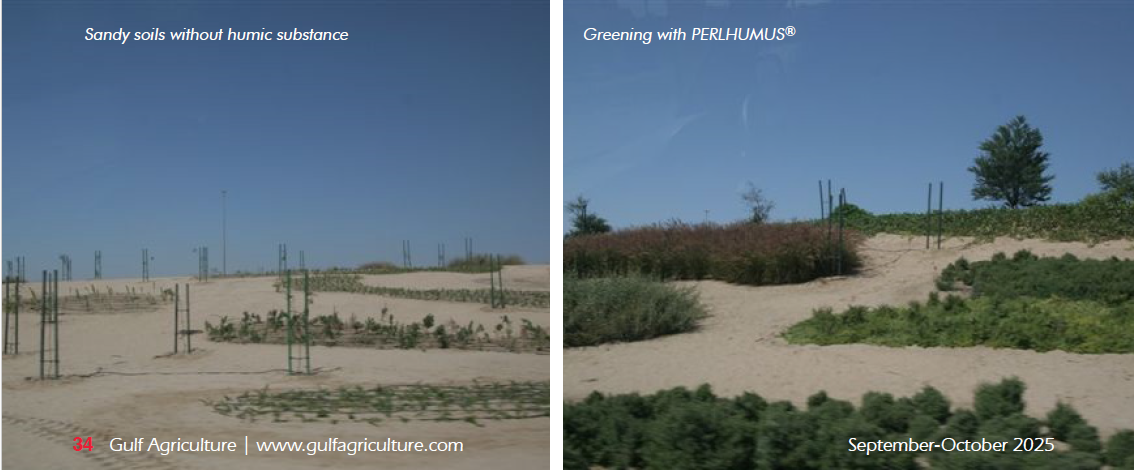HUMIC SUBSTANCES FOR SOIL STABILIZATION AND NUTRIENT MANAGEMENT IN GULF AGRICULTURE

The Gulf’s sandy, calcareous soils face severe challenges—low organic matter, poor nutrient retention, high salinity, and limited water-holding capacity. These conditions accelerate soil degradation and threaten long-term productivity. Humic substances, derived from high-quality leonardite, offer proven solutions to restore soil health and strengthen agricultural resilience.
With decades of proven success across the Middle East, Humintech has built strong partnerships and delivered measurable improvements in crop yield, soil quality, and water-use efficiency. This deep regional experience forms the foundation for introducing a new generation of solutions tailored to the Gulf’s unique agricultural conditions.
How Humic Substances Improve Soil
Humic acids enhance Cation Exchange Capacity (CEC), allowing soils to retain essential nutrients such as potassium, calcium, and magnesium. They also buffer pH, improving micronutrient availability in calcareous soils, and bind excess sodium, reducing salinity stress. This improves soil structure, boosts potassium uptake, and helps plants tolerate drought, heat, and salinity.
Water Retention and Soil Stability
In sandy soils, water drains quickly from the root zone. Humic acids improve aggregation and porosity, increasing water-holding capacity and reducing nutrient leaching. Stronger soil structure prevents wind erosion and moderates root-zone temperatures—critical in the Gulf’s hot, arid conditions. These improvements enhance water-use efficiency and lower production costs.
Leonardite: Building Long-Term Humus
Stable humus is essential for lasting soil fertility. It forms when organic carbon binds to clay particles, resisting decomposition for decades. Leonardite—rich in humic and fulvic acids—is a highly effective source of stable humus, far more concentrated and enduring than manure or compost. Continuous application is necessary to maintain optimal humus levels, as intensive farming can cause annual losses of up to 1 tonne per hectare.
Humintech’s SMART Concept
Humintech’s SMART framework supports 11 UN Sustainable Development Goals, focusing on:
- Sustainable: Long-term productivity and social impact
- Multifunctional: Enhancing resilience, water efficiency, and biodiversity
- Areal: Adaptable to diverse regions and farming systems
- Regenerative: Supporting microbiome health and ecosystem recovery
- Technology-Advanced: Precision farming and digital integration
MICROSENSE®: Next-Generation Biostimulants
Under the SMART framework, MICROSENSE® products address key crop stages and challenges:
- Swift: Enhances photosynthesis and stress tolerance
- Bloom: Supports flowering and fruit set
- Ca & B: Corrects calcium and boron deficiencies
- Root: Stimulates root growth and early germination
- Prime: Improves nutrient uptake and overall plant resilience
Dr. Yasser Dergham, Humintech’s Technical and Sales Manager, expressed his enthusiasm:
“This range is a science-based response to farmers’ real challenges, offering advanced, field-ready solutions. I am confident it will deliver results quickly and I am fully committed to supporting its adoption across the Gulf and beyond.”
Proven Field Results
In Egypt, POWHUMUS® increased potato yields up to 33% and boosted the share of marketable tubers up to 40%. For instance, in Jordan’s Badia, humic acid applications might support land restoration and soil rehabilitation.
Soil as a Climate Solution
Soils store up to three times more carbon than the atmosphere. One tonne of humus captures up to 1.8 tonnes of CO₂, making humus-building a powerful climate action strategy. The Gulf region has a unique opportunity to link soil health improvements with carbon sequestration initiatives.
Conclusion
In water-scarce, heat-stressed Gulf agriculture, humus is more than a soil amendment—it is a strategic resource. By enhancing soil fertility, water retention, and climate resilience, humic substances represent a high-impact, future-proof investment for sustainable agriculture in the region.
Greening with PERLHUMUS® — Sandy soils without humic substance
“With decades of proven success across the Middle East, Humintech has built strong partnerships and delivered measurable improvements in crop yield, soil quality, and water-use efficiency. This deep regional experience forms the foundation for introducing a new generation of solutions tailored to the Gulf’s unique agricultural conditions.”
PDF: Published in Gulf Agriculture | September–October 2025 Edition

